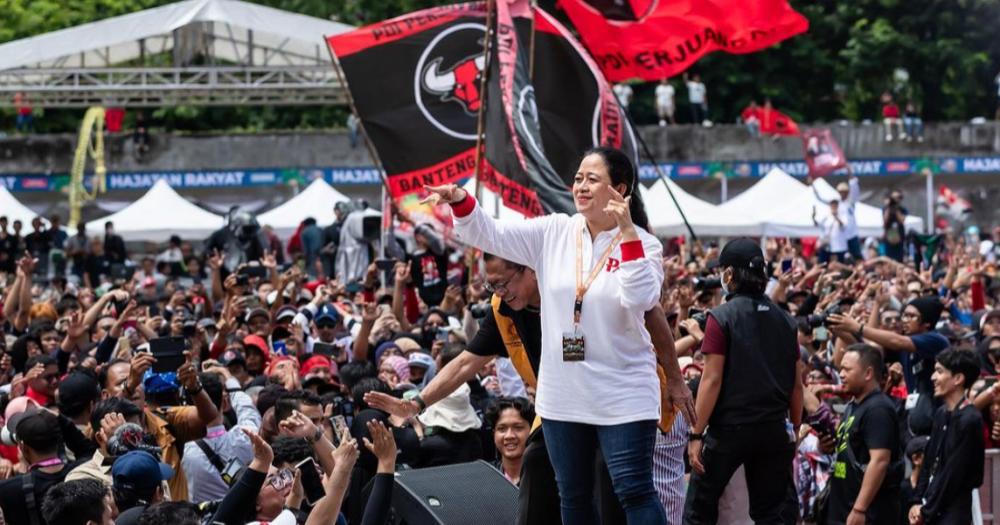Despite their representative coming up short in the presidential race, the Indonesian Democratic Party of Struggle (PDI-P) has won the most seats in Indonesia's House of Representatives, albeit winning fewer seats and votes than in 2019.
Remaining and results
On Feb. 14, Indonesia held a general election to decide who would be its next president, but also what the makeup of its parliament would be.
On Mar. 20th, Indonesia's Election Commission KPU released results for the legislative and presidential elections, as reported by the Jakarta Post and Kompas.
The PDI-P, led by former president Megawati Sukarnoputri, and technically the party of incumbent President Joko Widodo gained the most seats in the House of Representatives, the lower house of Indonesia's parliament.
It received 16.72 per cent of the popular vote and 110 seats.
PDI-P is also the party of presidential candidate Ganjar Pranowo, who received the least number of votes in the presidential election.
The PDI-P was closely followed by Golkar, traditionally the party of Indonesian strongman Suharto.
It received 15.29 per cent of the popular vote, with 102 seats.
The party of president-elect Prabowo Subianto, Gerindra, received 13.22 per cent of the popular vote, with 86 seats.
Parties supporting the second-place presidential candidate Anies Baswedan, the National Awakening Party (PKB), the NASDAM party, and the Prosperous Justice Party (PKS), came in fourth, fifth and sixth respectively.
If they continue to remain aligned, they may form the largest bloc in the House of Representatives, having received 69 seats for NASDAM, 68 seats for PKB, and 53 seats for PKS, a total of 190 seats.
Speaker of the house
The result is significant for several reasons.
In the run up to the 2024 presidential election, PDI-P was the only party which did not require a coalition in order to nominate a candidate, as it had more than 20 per cent of the seats in the House of Representatives.
With the results of the 2024 election, this is no longer true, and it will have to look for partners before the 2029 election.
But it does remain the largest party in the house, meaning that Megawati’s daughter Puan Maharani looks likely to retain her role as Speaker of the House.
After the 2019 presidential election, the various parties in the house of representatives consolidated together to give Jokowi an exceptionally large governing coalition.
His son, and vice president elect, Gibran Rakabuming Raka, was quoted by the Jakarta Globe as saying that he and Prabowo will reach out to other parties in order to form a similarly large coalition.
Speaking on March 21, Gibran said that one party outside Prabowo's coalition had already reached out.
He also claimed that ties between him and members of his former party PDI-P have not totally broken down, with several members congratulating him on his win.
Complaint lodging
Prabowo's coalition consists of his own political party, Gerindra, Golkar, the National Mandate Party, and the party of former president Susilo Bangbang Yudhoyono, the Democratic Party.
Prabowo is due to be inaugurated in October 2024.
Until then, it looks likely that he will face some legal challenges resulting from his election, due to accusations that he was unfairly supported by Jokowi's government.
Reuters reports that both Anies and Ganjar are planning to lodge complaints with the constitutional court, with Anies saying, “A leadership born out of a sullied process, with deviations, fraud, will produce a regime with unjust policies”.
The Diplomat reported in February that PDI-P also intends to contest the result. This might seem to cast doubt on the prospects of it returning to government in the near future.
However it should be remembered that in 2019, Prabowo's supporters took to the streets to protest the result but he ultimately became defence minister, arguably paving the way for his 2024 election victory.
Related stories
Top image via Puan Maharani/Instagram

If you like what you read, follow us on Facebook, Instagram, Twitter and Telegram to get the latest updates.



